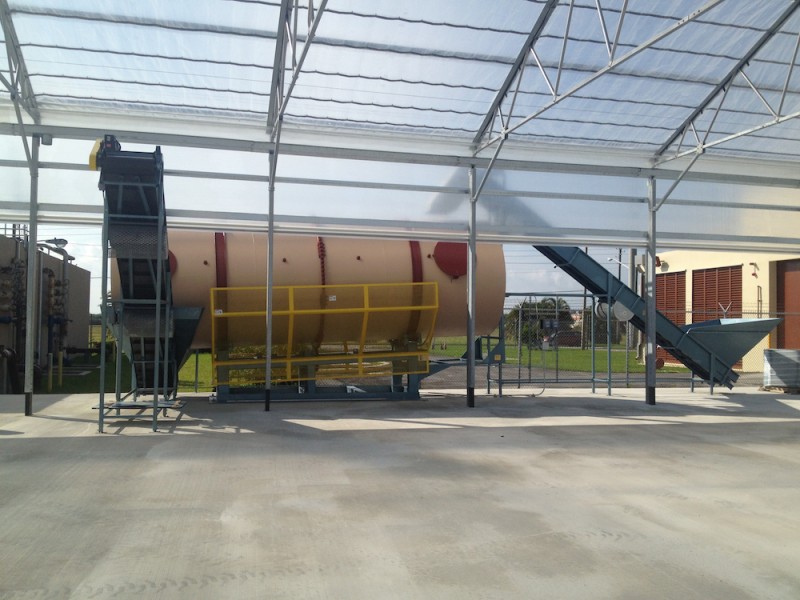Debate About Yard Waste Incineration Flares Up
“No, no, no this is a terrible idea!”
Laura Haight, New York Public Interest Research Group
For reasons that remain as cloudy as the smoke from a wood fire, Monroe County seems determined to pursue a plan to incinerate yard waste. At the same time, the commissioners may be ignoring a comparably priced plan to compost yard waste here in the Keys.
The commission discussed the plan for over an hour at its February 19 meeting and, after hearing from nine speakers, eight of whom opposed the plan, kicked the proposals back to the county’s sustainability program manager Rhonda Haag.
At issue is why the commission wants to burn organic material despite a recommendation of its own Climate Change Advisory Committee and why the BOCC is making a concerted push to do this without competitive bids, giving the project to local contractor Rudy Krause on Ramrod Key? Wednesday’s session seemed to move the discussion back toward issuing an RFP but Commissioner Neugent continued to make a strong push for incineration as a way to save money.
What is odd about this argument is that Haag, during her initial presentation, presented saving money as a way to keep taxes down whereas Neugent pitched it as a way to have the money to pursue sustainability plans.
Krause proposes to employ a process called “air-curtain burning“ that uses a mechanism that was designed principally as a pollution control device. The purpose of the air curtain is to stall or slow down the smoke particles on their way out of the firebox causing them to re-burn, further reducing their size to an acceptable limit.
Similar units were used after SuperStorm Sandy in New York and were quickly banned by the state because of excessive pollution. According to a press release from the American Lung Association in February of 2013,
“After repeated problems with smoke and high levels of air pollution, New York City has suspended the burning of downed trees and vegetative debris that remain from Hurricane Sandy. A federal contractor had been burning the debris in open air burners at Floyd Bennett Field in Brooklyn.
“Despite objections raised by environmental and public health advocates, the NYC Department of Environmental Protection (DEP) granted a variance from its own air pollution regulations last December to allow the burning to take place in so-called “air-curtain burners.”
The release went on to point out that these air-curtain burners, despite claims of their manufacturer, do cause air pollution.
“According to the U.S. Environmental Protection Agency, which set up air monitors around the perimeter of the site, air pollution levels in the vicinity of the burners exceeded health-based national ambient air quality standards for fine particulate matter (PM 2.5) on five separate days between December 28th and February 7th.”
Laura Haight, affiliated with a group called New York Public Interest Research Group (NYPIRG) in an email to the Blue Paper wrote that,
“Basically these are just large open-topped metal boxes where they burn the stuff. They use fans to blow air over the top to control the smoke and ash. That’s their high-tech sophisticated pollution control device. One of my co-workers dubbed them ‘dumpsters with fans.’”
A total of nine environmental and health agencies opposed the burning, explaining that
“…wood smoke contains at least 26 pollutants specified in the Clean Air Act as hazardous. Some include particulate matter, carbon monoxide, nitrogen oxides, volatile organic compounds, hazardous air pollutants and carcinogens. These gases can irritate the eyes, skin, and respiratory tract, impair lung function, and affect vital organs.”
Unlike New York City, the air quality in the Keys is very good so this kind of pollution could be a real concern, especially to those who live near the Rudy Krause Construction site.
Composting: A valid option

B&K 24 ft. long by 8 ft. diameter in-vessel composter with the loading conveyor on the right and the downloading conveyor on the left.
The alternative occurs via a process called “in-vessel composting”. The latter was proposed by South Dade Soil and Water Conservation District in a presentation to the commission in February of last year. The main advantage is that yard waste can be ground up and composted into a valuable soil amendment that can then be sold to the public. Another advantage of the plan is that it could also incorporate kitchen waste from commercial restaurants, thereby reducing the amount of garbage hauled to Broward by Waste Management and reducing fees.
The costs for the two plans are very close. According to the proposed contract Rudy Krause Construction would get $ 60 a ton for up to 10,000 tons to incinerate the yard waste versus the current fee of $ 84 a ton for hauling organic material up to Broward for incineration along with the rest of the trash from the county.
Morgan Levy, an administrator for South Dade Soil and Water, told the Blue Paper that,
“We discovered that a one year pilot project at Key Largo Transfer Station [for in-vessel composting] would cost $ 244,849.00 for all equipment, colorizer and training (2012 prices). Key Largo Transfer Station takes 8,978.94 tons per year of “separated” yard waste: 660.89 tons from Keys Sanitary; 8,032.75 tons from Ocean Reef; 285.30 tons from landscaping services with a 2012 disposal cost of $84.52/ton or $ 758,900.00 per year.”
Incinerating would be cheaper than the $84 a ton but composting could be even cheaper.
The incineration plan is for the Lower Keys where there is no separate collection of yard waste and would, therefore, entail an additional run for polluting garbage trucks. The composting proposal is for Key Largo where there is already a separate yard waste pickup.
Furthermore, according to Levy if the county approves a full scale in-vessel composting program for all three transfer stations, the equipment – representing the biggest chunk of the fees — can be used after the six-month pilot program to start a full program at Key Largo transfer station along with the other two stations.
South Dade Soil and Water also estimates revenue of over $90,000 from the sale of compost.
The claim that composting is too expensive, then, seems misguided at best.
Why no competitive bidding?
There’s a history to the issue of not seeking competitive bids for hauling or disposing of waste. At a September 17 session of the commission the commissioners debated about whether to bid out the county’s waste contracts and, in addition, whether to continue to make the new contracts under a five-year term or to allow the term to be extended to ten years. They voted to allow ten-year, no bid contracts.
They had already had a feisty debate at their August 21 meeting.
Commissioner Danny Kolhage challenged George Neugent’s claim that he could negotiate a better waste contract by adding an extra five years and not going out to bid. Neugent claimed that being able to “negotiate” with existing vendors would save the taxpayers millions of dollars.
Editor’s Note: As you watch the video below keep in mind that the “other part” the commissioners refer to is whether or not to exempt solid waste contracts from otherwise required competitive bidding procedures.
Kolhage: How do you know that George? Do you have information we don’t have?
Neugent: Yes.
Kolhage: Why is it that some commissioners have information that others don’t? I don’t know what you’re even talking about. That’s gotta change.
Neugent then admitted that he didn’t have any specific numbers and was working on them.
Neugent has since pushed hard for the contract with Rudy Krause Construction without any competitive bidding. Feeling the sting of some criticism he has strongly defended the plan to incinerate waste and wrote an op-ed in the Keynoter that was very close to the remarks he made to the Blue Paper previously. However, he compares incineration to transporting yard waste to Broward or to composting in the old fashioned way by spreading yard waste on the ground in windrows. Neugent never mentions the in-vessel plan presented by South Dade Soil and Water Conservation.
Another oddity about the entire process is that the county’s own Climate Change Advisory Committee has been excluded from the process of determining how to dispose of yard waste. When one member inquired about this, the county sustainability program manager pushed back.
She wrote:
“Please note [committee member], along with other CCAC members, have been kept abreast of information to the extent possible about many County sustainability initiatives. In fact, often the CCAC members are aware of information before the commissioners have been advised.
Terms change often during negotiations, and therefore details subject to change are not generally released until negotiations are near completion or when a decision is required from the Board.
We are still in negotiations for the incineration demo project, and there are potential new terms. Therefore an update has been scheduled at the February BOCC, so that the new terms may be aired in a public setting for the public and BOCC to hear.
All members of the public, including the CCAC members, are welcomed to attend and participate. A time certain of 11:00 am has been set for their convenience.
Thank you,
-Rhonda [Haag]
In its March 2012 meeting, the BOCC approved Commissioner Neugent’s initiative to have solid waste providers, with the input and cooperation of the CCAC, devise a three-year plan to eliminate the out-hauling of yard waste. Two months later (May 7, 2012), The CCAC heard presentations from Waste Management and South Dade Soil and Water Conservation District about potential composting options. The CCAC unanimously recommended that the Board of County Commissioners implement a local program for community composting to enhance waste diversion in Monroe County.
Then the BOCC heard that same presentation and got an offer for a pilot project to explore the feasibility and logistics of in-vessel composting at the Key Largo transfer station.
Two months later (May 7, 2013), the county sustainability manager provided the CCAC an overview of the Yard Waste Composting Pilot Project and announced that incineration had been added to the grinding and composting options. Later the commission voted 4-1 in favor of incineration.
The lengthy discussion at the February 19th session illustrated that the commissioners lacked full information about what’s involved, including the potential risks of incineration. They will now depend upon Ms. Haag to provide that guidance.
